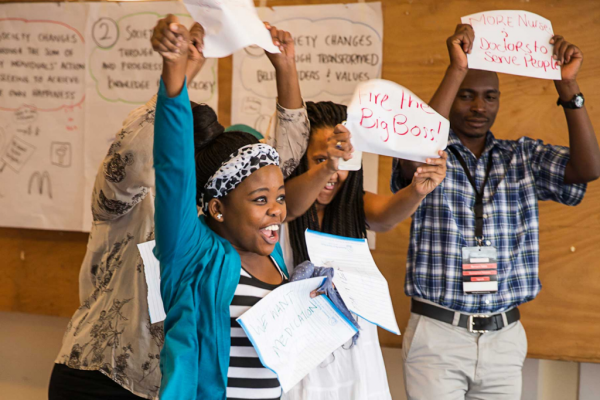Research & Evidence Programme Manager Duncan Edwards explains why he’s excited for the upcoming Open Knowledge Festival and outlines how we’re working to make open knowledge count:
I am really excited.
Next week up to about 1000 people will descend on Berlin with an interest and enthusiasm to work together on and explore a wide range of areas of open knowledge. There will be social activists, data geeks, hardware hackers, government officials, artists, librarians, computer programmers, journalists, academics, and singers all working on opening up access to data and information, visualising data, opening up science, technology, and government. OKFestival is going to be a melting pot.
I work for a programme called Making All Voices Count. It’s a large initiative looking to find innovative new ways for the voices of ALL citizens to really count in shaping the way their governments govern.
Making All Voices Count’s approach fosters and nurtures new and emerging ideas through learning, financial support, and the brokering of new relationships key to their success.
Openness is a key element in fostering innovation and collaboration and the programme will maximise openness whilst being responsibly mindful of privacy issues. This is a shameless plug but you can read more about my thoughts on Fostering innovation for social inclusion and improved governance here and where and how we see openness in the way Making All Voices Count operates.
Over the last six months, leading up to this year’s OKFestival, I have been working closely with the OKF team to curate the “Society” stream. I have been really encouraged to see more collaborative sessions and more sessions focussed on how we get beyond the tech and data to influence change in the world – particularly in terms of working more politically. Looking at the complete schedule, I’m really excited to see the OKFestival programme Beatrice Martini and her team have pulled together.
Making All Voices Count is sponsoring a number of sessions throughout the OKFestival programme we believe are highly relevant to our mission to make all voices count:
July 16 - Festival Day 1
-
11.45: Get Creative: Crafting & Conveying your Message through Grafitti: this session is designed to help non-artist professionals with the process of how to think creatively to convey information or message. A team of Nairobi-based graffiti artist-activists will help build strong concepts and narratives through visual and street art.
-
12.00: Using Open Data to Follow the Money; What’s been done? What needs doing?: This session will present and discuss a series of cases where multiple sources of open financial data have been used for campaigning purposes and to discuss the challenges that were faced and how these challenges were overcome.
-
14.00: Power, Politics, Inclusion and Voice: This session will explore power and politics and the importance of thinking about how these issues of power and who’s included/excluded will dictate whether our work will empower the powerless or simply strengthen the status quo.
-
16.30: Can Open Data go Wrong?: The free and open exchange of knowledge empowers people, promotes accountability and sparks creativity. However, publishing and using data for social good can sometimes have the opposite result…This session will provide a safe and private space for all those who wish to share their experiences of open data snafus, with the goal of transparently learning from our failures, and empowering new projects with roadmaps on how to open and share responsibly.
July 17 - Festival Day 2
-
12.00 Money, Politics & Transparency: This interactive session will introduce transparency projects and technology tools that help uncover the influence of money on politics. In addition, this session will explore the political-economy drivers of (more) effective political finance systems, and identify data that a government needs to publish.
- 14.00 Following the Money: Making the case for transparency and open data: It would be easier to make the case for greater transparency and more open data about the flow of public resources if there were more examples or use cases of people using information to follow and shape the flow of public resources, particularly in ways that extend beyond sectoral silos. This session, organized by the Follow the Money Network, provides a space for people to share their experience of advocating for transparency and open data about the flow of public resources, to identify shared challenges – particularly around the availability of use cases and examples – and discuss how they might be addressed.
You may notice some key themes in these sessions – creativity, power, politics, inclusion, voice and representation. Making All Voices Count has just published a series of 4 think pieces and 25 summaries which reflect on a review of key literature and experience which gives some useful background reading on these areas. I hope we, as an open knowledge community, can draw on the experience from other disciplines to ensure we can realise the potential of open knowledge in changing the world.
Finally, many participants will be in Berlin for the week meeting new people, engaging in a wide range of discussions, hacking code, wrangling data, generating and shaping new ideas. Making All Voices Count is supporting the Open Development Fringe Event on Friday 18th July at Wikimedia DE to enable people the space to discuss the issues and ideas that have bubbled up throughout the week to sit down and work out and map out what it would take to take open development ideas forward.
Let’s make open knowledge count!
